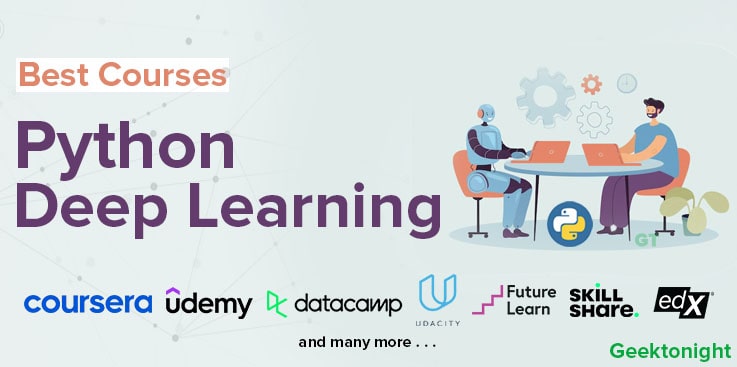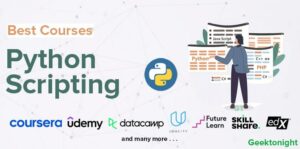If you are searching online for how to learn deep learning with python and looking for the best deep learning python courses, you are in the right place. Artificial Intelligence and machine learning have become the future of businesses. It becomes crucial to learn deep learning techniques to understand how a machine can work faster than humans.
Python is the key programming language used during building deep learning models and writing algorithms. To learn Python, you can check out the Best Python Courses I shared earlier. Deep Learning is the process of developing neural networks or thinking computers, and it requires coding strategies and understanding of artificial intelligence. It is not easy to become proficient in deep learning technology. You need to be skilled and talented to get a job in this profession. If you have doubts, why is it important to learn deep learning? Scroll down to know more

Why should you learn deep learning?
The demand for Machine Learning is growing exponentially, as a subset of Artificial Intelligence. Over the next decade, Machine Learning career opportunities are expected to grow by 200%, up from 75% during the previous four years. Engineers who pursue a Machine Learning career path will find more employment opportunities as the demand grows.
Job opportunities in AI and machine learning are higher in countries like the United States, Brazil, India, and Germany, among others. There has been a significant increase in this number in 2023. According to Glassdor.com, it is estimated that a machine learning engineer earns $1, 09,072 on average per year in the United States. There are almost 207,000 jobs on LinkedIn that require machine learning skills in the US.
Python is the main programming language used in building machine learning models and producing deep learning algorithms. If you are a Python programmer, you are good to take a career in deep learning. There are a number of Best Deep Learning Python Online Courses available for those who wish to advance their career in deep learning.
Table of Content
- 1 Best Deep Learning Python Courses, Certification, Tutorials, Training, Classes Online
- 1.1 Deep Learning Nanodegree Program [Udacity]
- 1.2 Introduction to Deep Learning in Python [DataCamp]
- 1.3 PyTorch for Deep Learning with Python Bootcamp [Udemy]
- 1.4 Data Science: Deep Learning in Python [Udemy]
- 1.5 Complete Guide to Tensorflow for Deep Learning with Python [Udemy]
- 1.6 Machine Learning with Python: From Linear Models to Deep Learning [edX]
- 1.7 Deep Learning Prerequisites: The Numpy Stack in Python (V2+) [Udemy]
- 1.8 Keras Tutorial: Deep Learning in Python [Datacamp]
- 1.9 Pytorch Essential Training: Deep Learning [Linkedin]
- 2 FAQ
Our product recommendations are unbiased and based on an independent review process. We may receive a commission for links to recommended partners. See our advertiser disclosure for more information.
Best Deep Learning Python Courses, Certification, Tutorials, Training, Classes Online
These are our picks for the best deep learning python courses:
- Best Overall Deep Learning Nanodegree Program [Udacity]
- Best for Basic Introduction to Deep Learning in Python [DataCamp]
- Best for PyTorch PyTorch for Deep Learning with Python Bootcamp [Udemy]
- Best for Data Science Data Science: Deep Learning in Python [Udemy]
- Best for TensorFlow Complete Guide to Tensorflow for Deep Learning with Python [Udemy]
- Best for ML Machine Learning with Python: From Linear Models to Deep Learning [edX]
- Best for Numpy Stack Deep Learning Prerequisites: The Numpy Stack in Python (V2+) [Udemy]
Deep Learning Nanodegree Program [Udacity]
Udacity Deep Learning Course brings you closer to world-changing technologies and becomes a neural networks expert. You will learn to implement neural networks using a deep learning framework Pytorch. You will build deep learning models for predictions and classifications that sound like complicated tasks and can’t be done with no intervention of humans. This best deep learning course gives you a taste of deep learning methods and Python libraries to build your first network.
Course Instructor
This Deep Learning with Pytorch Course was designed by more than 5+ professional instructors from various fields and machine learning engineers. The complete Deep Learning Nanodegree Program focuses on developing practical experience and work on real-world challenges like image generations, time-series predictions, etc.
What You’ll Learn
This Deep Learning Nanodegree Program has designed with three modules, including:
- Introduction to Deep Learning: This course will help you get a basic understanding of deep learning by learning its fundamentals. It will also help you discover how gradient descent and backpropagation underlie modern deep learning.
- Convolutional Neural Networks: This course will begin by introducing Convolutional neural networks, the most popular variety of neural networks with an emphasis on image processing.
- RNN and Transformers: This course discusses design patterns for RNN models with multiple architectures.
- Building Generative Adversarial Networks: In this course, you will learn how to construct and train several GAN architectures to produce fresh images to become more familiar with generative adversarial networks (GANs).
Pros & Cons
Pros
- Unlimited access to real-time classroom
- Real-world projects
- Certificate on Completion
Cons
- Paid course
Key Highlights & USPs
- Learn to build multi-layer neural networks using the modern framework Pytorch and analyze real-world data.
- Gain experience of using Anaconda and Jupyter Notebooks as development tools.
- Build convolutional networks and use them for classifying images based on patterns and objects appearing in them.
- Perform analysis on scripts using recurrent neural networks to generate new texts.
- Understand how GAN ( Generative Adversarial Networks) works for generating realistic images.
- Train your model to deploy and create a gateway for accessing it from a website.
- After each topic, a practice learned deep learning concepts on real-world projects from industry experts.
Who is it for?
This Udacity Nanodegree program has been specifically created for students who have intermediate experience with Python and are interested in learning AI and machine learning. If you have no prior experience in python programming, It’s okay. Before enrolling in this course, you can learn Python language from the Best Python Course Online. By completing this Intermediate Deep learning Program, you will be able to go further in the field or launch a successful career.
Rating: 4.5/5
Students Enrolled: 24,682
Duration: 4 months
Introduction to Deep Learning in Python [DataCamp]
The Datacamp Deep Learning course brings you closer to the most popular machine learning technique used for robotics, image recognition, and artificial intelligence. This online deep learning python course introduces you to the fundamental concepts and terminology of deep learning and neural networks. You will learn how to use Deep Learning with Keras 2.0 and understand why Deep Learning is so powerful today.
Course Instructor
Dan Becker, a data scientist and contributor to Keras, created this Introduction to Deep Learning in Python Course to understand each key concept and build deep learning models using the latest cutting-edge library. Dan will teach you how to apply machine learning models to make real-world decisions.
Pros & Cons
Pros
- Learn with industry-led Data Scientist
- Certificate on Completion
Cons
- Prior knowledge about Supervised Learning with Scikit-learn
Key Highlights & USPs
- This Datacamp Deep Learning in Python Course comprises four chapters, including:
- Basic of deep learning and neural networks
- Optimizing a neural network with backward propagation
- Building deep learning models with Keras
- Fine-tuning Keras models
- Learn Basics of Deep Learning and Neural Networks to build simple neural networks and generate predictions.
- Understand how to optimize generated predictions and how the backward propagation method works.
- Gain knowledge to build deep learning models using tools and Keras library for regression and classification.
- Get to perform optimization on your built deep learning models and experiment with deeper neural networks.
- Enhance practical skills by working on hands-on projects.
- Unlimited access to 17 video lectures, 50 practice exercises, and 4-hour study materials.
Who is it for?
This Datacamp deep learning course will take you through each course and answer queries regarding deep learning. It does require a prerequisite for supervised machine learning techniques with Scikit-learn. Before enrolling, you can go for an Introduction to machine learning course to understand the fundamentals of machine learning. With the completion, you will be able to finish your personal project or move towards a career as a deep learning scientist.
Rating: 4.3/5
Students Enrolled: 199,081
Duration: 4 hours
PyTorch for Deep Learning with Python Bootcamp [Udemy]
If you are thinking of starting your journey in Deep Learning, this PyTorch for Deep Learning certification is the perfect online package for you. You will gain the knowledge of creating art of the neural network with Facebook’s Pytorch library. Pytorch is an open-source platform that provides pathways from prototyping to production deployment. This popular framework integrated with Python supports computer vision, natural language processing, and artificial intelligence.
Course Instructor
Jose Portilla designed this Deep learning with Python Bootcamp for students to understand the usage of Python tools and libraries like Pytorch. Jose shares his analyzing skill and knowledge of programming to teach data science. Upon completion, you get the ability to apply the basics of Deep Learning for real-life purposes.
Pros & Cons
Pros
- Top-rated instructors
- Certificate on Completion
Cons
- Good but outdated training program
Key Highlights & USPs
- This Udemy Pytorch Deep Learning Course is divided into 12 sections and 97 video lectures to teach how to create neural networks for deep learning with PyTorch library.
- Learn to use the Pytorch library for writing neural networks.
- Understand how to use NumPy to format data into arrays.
- Develop knowledge of data manipulation and cleaning using Python’s Pandas Library.
- How Pytorch works for Image classification and sequence time series data.
- Creating the state of the deep learning networks with the tabular data.
- Build deep learning models to solve real-world problems and practice hands-on exercises.
- It provides full lifetime access to 2 articles, 2 downloadable resources, and 17 hours of on-demand video sessions
Who is it for?
This Deep Learning with Python tutorial will teach everything you want to know about Deep Learning and neural networks. It is designed for intermediate-level data scientists or Python developers who are interested in learning Deep Learning with PyTorch. In the end, this training course will enable you to create a wide variety of deep learning models to solve your own problems.
Rating: 4.6/5
Students Enrolled: 16,428
Duration: 17 hours
Data Science: Deep Learning in Python [Udemy]
Deep Learning in Python Programs available on Udemy provide a platform to learn in-depth theory of neural networks and understand how Python is used in Deep Learning. You will learn to build artificial neural networks using deep learning techniques. You get to use fundamentals for predicting actions and trends using given raw data from sources. It is one of the top deep learning in python courses to get a deep knowledge of predicting user actions, how many times they viewed the website, how long they stayed, and insights of returning visitors.
Course Instructor
This online deep learning for data science was created by Lazy Programmer, an AI and machine learning engineer to guide you with statistics, machine learning, algorithms, and more. You get to focus on Python’s libraries such as Google Tensorflow and Numpy in deep learning algorithms.
Pros & Cons
Pros
- Certificate on Completion
Cons
- No free audit
- Better to have knowledge of advanced math
Key Highlights & USPs
- This Data Science and Deep Learning Program has 49 sections and 89 video lectures, each section focusing on teaching how deep learning can be used on anything.
- Learn the Deep Learning training method called back propagation and how to code back propagation in Python.
- Understand how deep learning works, not only diagrams and magical black box code.
- Write programs for neural networks in NumPy.
- Enable to describe different types of neural networks and for which problems you can use them.
- Understand how to build multi-layer networks using neurons.
- At the end of the course, get a project to perform deep learning techniques on facial expression recognition and predict emotions based on a face picture.
- Get full lifetime access to all the study materials and assignments.
Who is it for?
This udemy online deep learning course is suitable for both beginners and programmers who want to use neural networks in machine learning and data science pipeline. There are suggested prerequisites such as calculus, arithmetic, and probability, along with basic knowledge of python programming. With successful completion, you will be able to use deep learning for facial expression recognition and be able to predict someone’s emotions by just looking at a picture using algorithms.
Rating: 4.6/5
Students Enrolled: 46,953
Duration: 11 hours
Complete Guide to Tensorflow for Deep Learning with Python [Udemy]
This tensorflow for deep learning tutorial presents a complete guide to using Google’s Tensorflow framework for deep learning. It aims to teach how to create artificial neural networks using an open-source software library – Tensorflow for computational and mathematical operations. Google Machine Intelligence research organization developed TensorFlow to conduct machine learning and deep neural networks. This Machine Learning Software Library has adapted to a wide variety of companies such as IBM, Airbnb, Google, eBay, Twitter, and the list goes on.
Course Instructor
Jose Portilla, the author of this deep learning with python certification, teaches you TensorFlow with Python to solve problems. You will learn the practical implementation of deep learning theory with Jupyter notebooks and guides full of code and notes. This Deep Learning syllabus covers a range of topics like ANN ( artificial neural networks), CNN ( convolutional neural networks), RNN ( Recurrent Neural Networks), and so on.
Pros & Cons
Pros
- Plenty of exercises to test your skills
- Certificate on Completion
Cons
- More theoretical and less practical
Key Highlights & USPs
- Learn how neural networks work and build them from scratch using Python.
- How to use TensorFlow for classification and regression tasks.
- Develop knowledge of Recurrent Neural Networks to predict time series
- Conduct reinforcement learning with Open AI Gym.
- Classify Images with Convolutional Neural Networks using TensorFlow.
- Solve unsupervised machine learning problems with Autoencoders.
- Gain an understanding of creating Generative Adversarial Networks.
- Full lifetime access to 7 articles, 4 downloadable resources, and code nodes for practice exercises.
Who is it for?
You can become a deep learning expert by taking this python deep learning tutorial. It is designed for Python students to upgrade their knowledge and learn the latest Deep Learning techniques with TensorFlow. After completing this intermediate-level deep learning program, you will be accredited with a certificate of completion.
Rating: 4.5/5
Students Enrolled: 90,000
Duration: 14 hours
Machine Learning with Python: From Linear Models to Deep Learning [edX]
edX brings you a machine learning with python tutorial to get an in-depth introduction of machine learning and get an overview of deep learning. You will learn machine learning methods used for designing and understanding computer programs from human experience. This machine learning online course provides a complete curriculum to understand key principles and algorithms for the purpose of predictions and controls.
Course Instructor
This MIT machine learning course is designed to teach you from linear models to deep learning and reinforcement learning. It is a part of the MITx MicroMasters program in Statistics and Data Science that provides courses to master the skills as a data science expert.
Pros & Cons
Pros
- Free audit
- Certificate on Completion
Cons
- Limited access to free version
Key Highlights & USPs
- Learn principles behind machine learning problems such as logistic regressions, classification, clustering, regression and reinforcement learning.
- How to implement and analyze machine learning models and neural networks.
- Understand how to select linear or graphic models for different applications.
- Get an overview of how to train, validate, check parameters, and organize machine learning projects.
- Gain a firm knowledge of writing algorithms for turning data into automated predictions.
- Through hands-on projects, improve your practical skills and apply them to understand customer behaviour, predict trends or risk.
Who is it for?
This advanced-level deep learning with python course is right for college graduates and professionals who have basic prerequisites of python programming and intermediate maths. By completing this part of Data Science Specialization, you will gain knowledge on how to implement and experiment with the algorithms in several Python projects for different applications.
Rating: 4.5/5
Students Enrolled: 135, 274
Duration: 4 months, 10 hours/week
Deep Learning Prerequisites: The Numpy Stack in Python (V2+) [Udemy]
Udemy has become a hot place to learn data science and deep learning. This Deep Learning Tutorial prepares you for the future of AI and machine learning. You will learn about Python libraries and packages such as NumPy, Scipy, Pandas, and Matplotlib. This Udemy Online Deep Learning Program teaches you to read the code and turn those algorithms into actual running code.
Course Instructor
Lazy programmer Inc. created this Numpy stack in Python course for learners to understand Numpy array and how it optimizes the speed of operations than Python, how Pandas ease the loading of datasets, and how to show images using Matplotlib.
Pros & Cons
Pros
- 30-day money-back guarantee
- Certificate on Completion
Cons
- Paid Course
Key Highlights & USPs
- This Udemy Deep Learning Numpy Training Program consists of 12 sections and 51 video lectures to show how to use NumPy and write code for deep learning and data science.
- Learn NumPy to do vector operations such as addition, subtraction, and multiplication and perform matrix operations like determinants, inverses, products, and solving linear systems.
- Gain knowledge of Python’s Pandas library to evaluate the data and visualize them.
- Matplotlib describes plots such as histogram, scatter plot, and line chart.
- Perform statistical calculations and testing using Scipy.
- Understand supervised and unsupervised machine learning with real-world examples using Scikit Learn.
- Determine the pros and cons of machine learning models, including decision trees, Random forest, linear regression.
Who is it for?
It is an advanced-level deep learning with Numpy Stack in Python course for students and professionals who have little Numpy experience and plan to build a career in data science and machine learning. Upon completion, you will master the art of turning algorithms into actual running code and earn a certificate to get an impressive job.
Rating: 4.6/5
Students Enrolled: 242,241
Duration: 12 hours
Keras Tutorial: Deep Learning in Python [Datacamp]
Are you looking for a deep learning in python tutorial online? This Datacamp online tutorial is an absolute choice for you. It is a step-by -step guide to use Python and its libraries to understand, analyze and visualize the data. Deep learning is one of the cutting-edge technologies in data science that is mainly used for robotics, image recognition and more AI applications. You will learn the most powerful Python library, Keras for building and evaluating deep learning models.
Course Instructor
This Datacamp Keras Tutorial was created by Karlijn Willems to introduce you to the basics of Python Deep Learning and developing neural networks in an easy way. You get to focus on deep learning and how its set of instructions is used to automate real-world problems.
Key Highlights & USPs
- Learn what are the Artificial Neural Networks and how to use them as powerful modeling tools.
- How to preprocess data by splitting them in datasets to train, test and finally, standardize for building networks.
- Build up multi-layer perceptrons or neurons for doing complicated tasks.
- Compile and fit data into built models and use data for predictions.
- Evaluate the performance and validations of models.
- Enable to build up models for regression tasks and fine-tune them.
- Perform code exercises to enhance practical knowledge.
Who is it for?
It gives a jumpstart to start your deep learning journey with Python and Keras. This Deep learning in Python tutorial is for beginners who are interested in strengthening knowledge in Python. It is a free Datacamp Deep neural network tutorial available for everyone.
Rating: 4/5
Duration: 3 hours
Pytorch Essential Training: Deep Learning [Linkedin]
The Linkedin Learning platform has launched a Deep Learning Pytorch Training to learn about the deep integration of Pytorch in Deep Learning. This modern deep learning framework gained popularity among industry leaders as it gets easily integrated with top cloud platforms such as Google cloud platform and Amazon Sagemaker.
Course Instructor
Jonathan Fernandes created this deep learning syllabus to dive into the pool of deep learning concepts and work on image recognition models to gain experience with neural networks. He focused mainly on hot subjects such as data science, AI, and big data.
Key Highlights & USPs
- Get to use Google Colaboratory to run Pytorch.
- Learn how deep integration with Python works to organize datasets and build neural networks with data inputs.
- How to work with tensors and classes to train the network.
- Understand the work of loss functions, autograd, and optimizers for troubleshooting a Pytorch network.
- Gain a must-have deep learning skill in the artificial intelligence tool kit.
- Sharpen your knowledge by trying your hands on Future Project Ideas.
Who is it for?
This Intermediate Deep Learning with Pytorch Course is for programmers and computer experts who understand concepts of neural networks and deep learning and use of Python. After successful completion, you can showcase on your LinkedIn profile and demonstrate your skill to get an entry-level job as a data scientist.
Rating: 4.4/5
Students Enrolled: 20K
Duration: 1 hours
FAQ
What is Deep Learning in Python?
Deep learning is a powerful machine learning technique that works with artificial neural networks to imitate human thinking and learn from it. Deep learning in Python means the Python programming language used to write reliable systems to solve machine learning problems.
Python’s code simplicity and consistency require less time to understand and make it easy for developers to focus on building neural networks. It has many libraries to build prototypes quickly and test your models for deep learning purposes.
Is Python good for deep learning?
Yes, Python is a good language for deep learning. Its easy-to-read code offers the ability to implement complex algorithms and versatile workflows behind Deep Learning and AI.
It eases the pain of wasting time on understanding the programming language. It provides many frameworks and libraries that reduce development time and cost for the programmers. An extensive set of libraries is available for artificial intelligence and machine learning like Keras, Numpy, Scikit Learn, Pandas, Tensorflow, and more.
Should I learn Python before Deep Learning?
Yes, You should learn Python or have in-depth knowledge along with algebra, probability, and programming experience. Once you have done it, you can take any online course from the above list of best deep learning online courses. You can also start by taking machine learning courses and work your way up.
How long does it take to learn Python?
It can take 5 to 10 weeks to learn a general-purpose programming language that covers basic concepts such as data types, loops, functions, and more.
Is Python better than Matlab for deep learning?
Yes, Indeed. It is way better than Matlab based on performance and also how easily accessible and readable Python is.
I have researched and prepared the above-mentioned list of all the Best 10 Deep Learning Python Courses and Certifications for you. If there’s any course left and you think it should be part of the list, please write down in the comments below. Hope this article will benefit you. Stick to the Geektonight to know more about machine learning, Python, Data Science, and the latest updates about these technologies.









